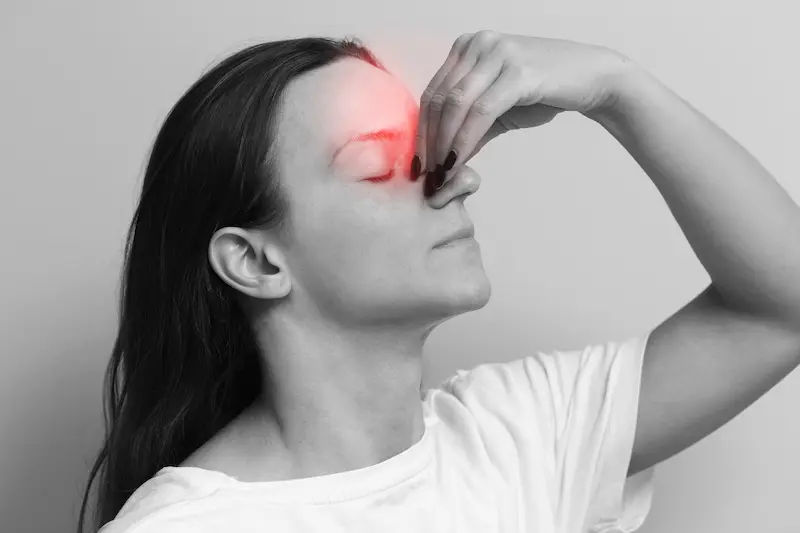Signs Of Chronic Sinusitis
Persistent stuffy nose, facial pain, and frequent headaches could signal chronic sinusitis. Learn the key symptoms and when to see a doctor for lasting relief.

Written by Dr. Rohinipriyanka Pondugula
Reviewed by Dr. Vasanthasree Nair MBBS
Last updated on 13th Jan, 2026

Introduction
Feeling constantly stuffy, with pressure building behind your eyes and a cough that just won’t quit? You might brush it off as a never-ending cold or stubborn allergies. But when these symptoms linger for weeks or even months, it could point to a deeper issue: chronic sinusitis. This condition goes far beyond a simple nasal blockage, impacting millions and significantly affecting daily life. Understanding the full spectrum of signs is the first step toward finding lasting relief. This guide will walk you through the common and not-so-obvious symptoms of chronic sinusitis, helping you distinguish it from other conditions and empowering you to seek the right help.
What exactly is Chronic Sinusitis?
Chronic sinusitis is a persistent inflammatory condition affecting the sinuses—the hollow, air-filled cavities in the skull around your nose. For a diagnosis to be made, symptoms must typically last for 12 weeks or longer, despite attempts at treatment. It occurs when the sinus linings become inflamed and swollen, obstructing the tiny drainage pathways. This leads to a buildup of mucus, creating the perfect environment for discomfort and, sometimes, infection. Unlike acute sinusitis, which is often a temporary complication of a cold, the chronic version is a persistent state of inflammation that requires a more comprehensive management approach.
Chronic vs. Acute Sinusitis: Understanding the Key Difference
The primary difference lies in duration and frequency. Acute sinusitis is short-term, usually lasting up to 4 weeks, and is often viral or bacterial. It typically resolves with time or a short course of treatment. Chronic sinusitis, on the other hand, is a long-term condition. You might experience persistent symptoms that wax and wane but never fully disappear. It's less about a single infection and more about ongoing inflammation, often linked to underlying causes like allergies or structural problems.
The 8 Most Common Signs of Chronic Sinusitis
Recognizing the hallmark symptoms is crucial. If you experience two or more of the following signs consistently, it’s a strong indicator of chronic sinusitis.
1. The Unshakable Nasal Congestion and Obstruction
This isn't your typical one-nostril-stuffy cold. The congestion is often bilateral, meaning both sides of your nose feel blocked, making it difficult to breathe freely. This obstruction is caused by swollen nasal passages and can lead to a "nasal" voice and difficulty sleeping.
2. Thick, Discolored Nasal Discharge (Post-Nasal Drip)
You may notice thick, yellow or green discharge from your nose. More commonly, this mucus drains backward down your throat—a sensation known as post-nasal drip. This is a key symptom of chronic sinusitis and can cause a constant need to clear your throat, leading to irritation.
3. Facial Pain, Pressure, and Tenderness
The inflammation and mucus buildup create a feeling of fullness and pressure. This pain is often localized to specific areas: the forehead (frontal sinuses), behind the eyes and bridge of the nose (ethmoid sinuses), or in the cheeks and upper jaw (maxillary sinuses). The pain might worsen when you bend forward.
4. The Significant Loss of Smell and Taste (Anosmia/Hyposmia)
The swelling in the upper nasal passages can block the olfactory cleft, where smell receptors are located. This leads to a reduced (hyposmia) or complete loss (anosmia) of smell. Since smell and taste are intimately linked, this almost always results in a diminished sense of taste, affecting appetite and enjoyment of food.
Health Topic Carousel:
Doctor Speciality: General Physician
Text: Consult Top Specialists
Less Obvious but Telling Symptoms
Beyond the primary signs, chronic sinusitis can manifest in ways you might not immediately connect to your sinuses.
Chronic Sinusitis Headaches: A Distinct Pattern
A sinus headache is often confused with migraines or tension headaches. However, it's typically characterized by a deep, constant, throbbing pain in the front of the face and head that intensifies with sudden head movements or straining. It's directly tied to the sinus pressure and usually worsens in the morning after mucus has pooled overnight.
Ear Pressure, Fullness, and Dental Pain
The sinuses are interconnected with the ears via the Eustachian tubes. Inflammation can cause dysfunction in these tubes, leading to a feeling of fullness, pressure, or even muffled hearing. Similarly, the roots of your upper teeth are located very close to the maxillary sinuses. Inflammation in these sinuses can refer to pain in the teeth, making you feel like you have a toothache when the problem is actually sinus-related.
The Sinusitis Cough and Sore Throat Connection
The persistent trickle of infected or irritating mucus from post-nasal drip is a major cause of a chronic sinusitis cough. This cough is often worse at night when you're lying down. The constant drip also inflames the throat, leading to a persistent, raspy sore throat and hoarseness.
Fatigue and the "Sinusitis Fog"
Living with constant discomfort, poor sleep due to congestion, and your body's ongoing fight against inflammation is exhausting. Many people with chronic sinusitis report significant fatigue, malaise, and a feeling of mental cloudiness or "brain fog," which can impact concentration and productivity.
What's Triggering Your Chronic Sinusitis?
Understanding the root cause is essential for effective treatment. Common triggers include:
The Role of Allergies and Environmental Irritants
Allergic rhinitis (hay fever) is a major contributor. Inhaled allergens like pollen, dust mites, and pet dander cause inflammation that can block the sinuses. Irritants like smoke, pollution, and strong chemical fumes can have a similar effect.
Structural Issues: Nasal Polyps and Deviated Septum
These are physical blockages. Nasal polyps are soft, noncancerous growths that can dangle into the nasal passage, obstructing drainage. A deviated septum—when the wall between your nostrils is crooked—can also block sinus pathways on one or both sides.
When to See a Doctor?: Red Flags and Next Steps
If your symptoms persist beyond two weeks, it's wise to seek medical advice. Consult a doctor online with Apollo24|7 for an initial evaluation. However, you should seek immediate or in-person care if you experience:
Severe symptoms like high fever, double vision, or a swollen forehead.
Symptoms that worsen after initially improving.
Symptoms that don't improve with over-the-counter medications.
A doctor, often an ENT specialist, can diagnose chronic sinusitis through a physical exam and possibly a nasal endoscopy or CT scan to view your sinuses. If your condition does not improve after trying initial methods, book a physical visit to a doctor with Apollo24|7 for a comprehensive examination.
Conclusion
Living with the constant symptoms of chronic sinusitis can be a draining experience that affects your physical comfort, sleep, and overall quality of life. By recognizing the full range of signs—from the obvious facial pressure to the less-apparent fatigue and brain fog—you are better equipped to describe your experience to a healthcare provider. Remember, this is a manageable condition. While it may require a multifaceted approach, including medications, lifestyle changes, or in some cases, surgery, effective solutions are available. Don't resign yourself to a perpetually stuffy existence. Taking the step to understand your symptoms is the first move toward clearing the air and breathing freely again. If your symptoms sound familiar, consider speaking with a specialist today to explore your options for relief.
Health Topic Carousel:
Doctor Speciality: General Physician
Text: Consult Top Specialists
Frequently Asked Questions (FAQs)
1. Can chronic sinusitis make you feel dizzy?
A. Yes, it can. The inflammation and congestion can affect your inner ear via the Eustachian tubes, leading to a feeling of imbalance or lightheadedness, though true vertigo (spinning sensation) is less common.
2. What is the best natural remedy for sinus pressure?
A. Saline nasal irrigation (using a neti pot or squeeze bottle) is one of the most effective natural remedies. It helps flush out mucus and allergens. Steam inhalation and warm compresses applied to the face can also provide temporary relief from sinus pressure.
3. How is chronic sinusitis officially diagnosed?
A. A doctor typically diagnoses it based on your symptom history and a physical exam, often using a nasal endoscope to look inside your nose. In some cases, a CT scan of the sinuses is ordered to get a detailed view of the inflammation and any structural blockages.
4. Are there specific foods to avoid with chronic sinusitis?
A. While not a direct cause, dairy products can thicken mucus for some people, potentially worsening congestion. Staying well-hydrated by drinking plenty of water is generally recommended to help thin mucus.
5. Can chronic sinusitis be cured?
A. For many, it is a long-term condition that can be effectively managed rather than "cured" in the traditional sense. The goal of treatment is to reduce the frequency and severity of symptoms, control inflammation, and address underlying causes to improve your quality of life.
Consult Top Specialists for Personalised Tips
Dr. Venkatesh Billakanti
General Physician/ Internal Medicine Specialist
15 Years • M.D ( GENERAL MEDICINE), M.V.J MEDICAL COLLEGE – HOSKOTE, BANGALORE,KARNATAKA ,M.B.B.S – MEDICITY INST OF EDICAL SCIENCES – T.G , F.I.C.M – CRITICAL CARE – APOLLO JUBLI HILLS ,CCMBE – ONLINE COURSE ON ANTIBIOTIC STEWRDSHIP
Hyderabad
Apollo Hospitals Financial District, Hyderabad

Dr. Samir Dasgupta
Internal Medicine Specialist Diabetologist
40 Years • M.B.B.S., M.D. (Internal Medicine)
Kolkata
Apollo Hospitals, Narendrapur, Kolkata, Kolkata
Dr. Sagarika Nanda
Infectious Disease specialist
9 Years • "• Fellowship of National Board Infectious Diseases Apollo Hospitals Jubilee Hills 2022 • MD General Medicine KMC Manipal 2013 • MBBS & Internship KMC Manipal 2003 -2009"
Hyderabad
Apollo Hospitals Financial District, Hyderabad

Dr. Sudhir Chalasani
General Physician/ Internal Medicine Specialist
15 Years • MBBS, MD (Internal Medicine)
Hyderabad
Apollo Hospitals Jubilee Hills, Hyderabad
(150+ Patients)

Dr. B Sivananda Reddy
General Physician
12 Years • D M ( OSMANIA MEDICAL COLLEGE, KNRUHS ) MD ( KASTURBA MEDICAL COLLEGE , MAHE) MBBS ( PESIMS&R, NTRUHS).
Secunderabad
Apollo Hospitals Secunderabad, Secunderabad
Consult Top Specialists
Dr. Venkatesh Billakanti
General Physician/ Internal Medicine Specialist
15 Years • M.D ( GENERAL MEDICINE), M.V.J MEDICAL COLLEGE – HOSKOTE, BANGALORE,KARNATAKA ,M.B.B.S – MEDICITY INST OF EDICAL SCIENCES – T.G , F.I.C.M – CRITICAL CARE – APOLLO JUBLI HILLS ,CCMBE – ONLINE COURSE ON ANTIBIOTIC STEWRDSHIP
Hyderabad
Apollo Hospitals Financial District, Hyderabad

Dr. Samir Dasgupta
Internal Medicine Specialist Diabetologist
40 Years • M.B.B.S., M.D. (Internal Medicine)
Kolkata
Apollo Hospitals, Narendrapur, Kolkata, Kolkata
Dr. Sagarika Nanda
Infectious Disease specialist
9 Years • "• Fellowship of National Board Infectious Diseases Apollo Hospitals Jubilee Hills 2022 • MD General Medicine KMC Manipal 2013 • MBBS & Internship KMC Manipal 2003 -2009"
Hyderabad
Apollo Hospitals Financial District, Hyderabad

Dr. Sudhir Chalasani
General Physician/ Internal Medicine Specialist
15 Years • MBBS, MD (Internal Medicine)
Hyderabad
Apollo Hospitals Jubilee Hills, Hyderabad
(150+ Patients)

Dr. B Sivananda Reddy
General Physician
12 Years • D M ( OSMANIA MEDICAL COLLEGE, KNRUHS ) MD ( KASTURBA MEDICAL COLLEGE , MAHE) MBBS ( PESIMS&R, NTRUHS).
Secunderabad
Apollo Hospitals Secunderabad, Secunderabad




